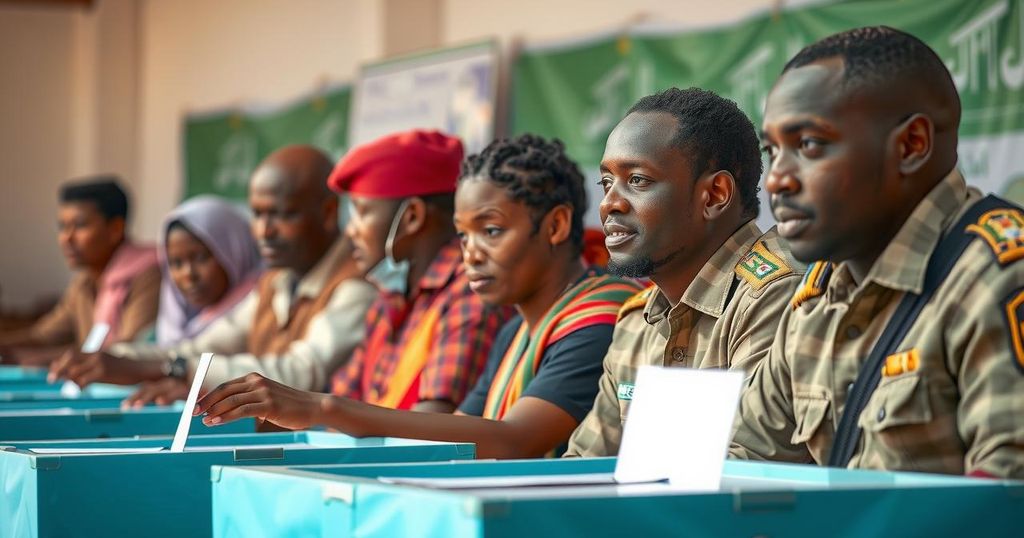Chad’s General Election: A Contest of Legitimacy Amidst Boycotts and Apathy

Chad conducted a contentious general election on Sunday amidst calls for boycott by opposition parties, resulting in an expected low voter turnout. Observers noted a participation rate of only 38 percent, with allegations that results were predetermined. Despite the government’s assertion that the elections marked a crucial step towards democracy, widespread skepticism about electoral integrity persists, compounded by the ongoing security issues faced by the nation.
Chad held a general election on Sunday, which the government describes as an important step towards terminating military rule, although low voter turnout appeared likely after opposition parties called for a boycott. As reported by the election management agency ANGE, midday figures indicated that only 38 percent of voters participated to select new parliament members, provincial assemblies, and local councils. Election officials attributed the lack of engagement to cold weather, while opposition leaders argued that the election’s outcome had already been predetermined.
Opposition leader Succes Masra stated that the majority of voters heeded the call to boycott, suggesting that candidates loyal to President Mahamat Idriss Deby Itno would have an unchallenged advantage. Following his ascension to power via military forces in 2021 and a controversial presidential election held in May, during which opposition candidates raised concerns of fraud, Deby attempted to encourage voters to participate through social media.
Local sentiments ranged from disillusionment to a desire for systemic improvement. Many citizens voiced doubts about the effectiveness of the electoral process, while others expressed hopes for positive change in employment and social equity. During the elections, military personnel, police officers, and nomadic groups voted a day earlier, revealing a stark contrast between their participation rates and the general populace’s reluctance.
In analyzing voter motivations and concerns, it became evident that the elections were held amidst a backdrop of security threats from groups like Boko Haram and ongoing regional instability. Despite the government’s assertions that these elections signify a pivotal transition to democracy, skepticism surrounding the electoral integrity remains pervasive. Reports of missing ballots and allegations of electoral fraud surfaced, further complicating the narrative surrounding these elections.
As polling stations remained operational until late afternoon, foreign electoral observers and party representatives monitored the progress closely. The ruling government has framed these electoral proceedings as crucial to the nation’s democratic transition, a promise made after President Deby’s assumption of leadership following his father’s long-standing reign.
In conclusion, the recent elections in Chad reveal a complex interplay of political aspirations coupled with widespread voter apathy, skepticism, and sociopolitical challenges. While the government views these elections as a democratic advancement, the reality of public sentiment and political integrity casts doubt on the legitimacy and effectiveness of this electoral process.
The current electoral situation in Chad is rooted in a historical context characterized by military governance and political instability. Following the death of longtime leader Idriss Déby Itno in April 2021, his son, Mahamat Idriss Deby Itno, assumed power and announced a transitional military council. In May 2023, the first post-military elections were held, but they were met with significant opposition boycotts and allegations of pre-arranged outcomes. The attempt to transition from military to civilian rule amidst regional conflicts and pressing social issues poses considerable challenges for any subsequent government.
The recent election in Chad reflects a critical moment in the ongoing struggle between military rule and democratic governance. Voter turnout was significantly low, primarily due to a boycott urged by opposition parties amidst claims of predetermined results. As President Deby seeks to legitimize his rule through these elections, the lingering skepticism and calls for improved governance underscore the populace’s demand for meaningful political change. The road ahead remains fraught with challenges, as Chad navigates its path to democracy.
Original Source: www.khq.com








